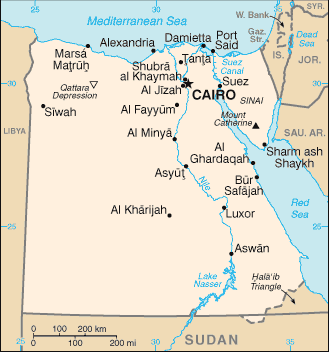| Egypt |
|
|
 |
|
| Geography | |
| Location: | Northern Africa, bordering the Mediterranean Sea, between Libya and the Gaza Strip, and the Red Sea north of Sudan, and includes the Asian Sinai Peninsula. |
| Area: | total: 1,001,450
sq km land: 995,450 sq km water: 6,000 sq km |
| Natural Resources: | petroleum, natural gas, iron ore, phosphates, manganese, limestone, gypsum, talc, asbestos, lead, zinc |
| Population and Health | |
| Population: | 86,895,099 (July 2014 est.) |
| Age structure: | 0-14 years: 32.1% (male 14,272,494/female 13,639,550) |
| Population growth rate: | 1.84% (2014 est.) |
| Birth rate: | 23.35 births/1,000 population (2014 est.) |
| Death rate: | 4.77 deaths/1,000 population (2014 est.) |
| Sex ratio: | at birth: 1.05 male(s)/female |
| Infant mortality rate: | total: 22.41 deaths/1,000 live births |
| Life expectancy at birth: | total population: 73.45 years |
| Total fertility rate: | 2.87 children born/woman (2014 est.) |
| Current contraceptive use among married women 15-49 years old(any method): | 60% (2007-2012) |
| Unmet need of contraceptive: | 11.6% (2008) |
| HIV/AIDS - people living with HIV/AIDS: | 6,500 (2012) |
| HIV/AIDS - deaths: | 300 (2012) |
| Literacy: | definition: age 15 and over can read and write |
| Economy | |
| GDP (purchasing power parity): | $551.4 billion (2013 est.) |
| GDP (official exchange rate): | $262 billion (2013 est.) |
| GDP - real growth rate: | 1.8% (2013 est.) |
| GDP - per capita (PPP): | $6,600 (2013 est.) |
| GDP - composition by sector: | agriculture: 14.5% |
| Labor force - by occupation: | agriculture: 32% industry: 11.4% services: 57.6% |
| Population below poverty line: | 22% (2008 est.) |
| Inflation rate (consumer prices): | 9% (2013 est.) |
| Agriculture - products: | cotton, rice, corn, wheat, beans, fruits, vegetables; cattle, water buffalo, sheep, goats |
| Industries: | textiles, food processing, tourism, chemicals, pharmaceuticals, hydrocarbons, construction, cement, metals, light manufactures |
| Industrial production growth rate: | 1.4% (2013 est.) |
| Exports - commodities: | crude oil and petroleum products, cotton, textiles, metal products, chemicals, processed food |
| Currency (code): | Egyptian pound (EGP) |
| Fiscal year: | 1 July - 30 June |
| Others | |
| Nationality: | noun: Egyptian(s) adjective: Egyptian |
| Religions: |
Muslim (mostly Sunni) 90%, Coptic 9%, other Christian 1% |
| Languages: |
Arabic (official), English and French widely understood by educated classes |
| Country name: | conventional
long form: Arab Republic of Egypt conventional short form: Egypt |
| Government type: | republic |
| Capital: | name: Cairo geographic coordinates: 30 03 N, 31 15 E time difference: UTC+2 (7 hours ahead of Washington, DC during Standard Time) daylight saving time: +1hr, begins last Friday in April; ends last Friday in September |
| Administrative divisions: | 29 governorates (muhafazat, singular - muhafazat); Ad Daqahliyah, Al Bahr al Ahmar (Red Sea), Al Buhayrah (El Beheira), Al Fayyum (El Faiyum), Al Gharbiyah, Al Iskandariyah (Alexandria), Al Isma'iliyah (Ismailia), Al Jizah (Giza), Al Minufiyah (El Monofia), Al Minya, Al Qahirah (Cairo), Al Qalyubiyah, Al Uqsur, Al Wadi al Jadid (New Valley), As Suways (Suez), Ash Sharqiyah, Aswan, Asyut, Bani Suwayf (Beni Suef), Bur Sa'id (Port Said), Dumyat (Damietta), Helwan, Janub Sina' (South Sinai), Kafr ash Shaykh, Matruh (Western Desert), Qina (Qena), Shamal Sina' (North Sinai), Sittah Uktubar, Suhaj (Sohag) |
| Independence: | 28 February 1922 (from the UK) |
| Legal system: | based on French common law, Islamic law, and Napoleonic codes; judicial review by Supreme Court and Council of State (oversees validity of administrative decisions); accepts compulsory ICJ jurisdiction, with reservations |
|
|
Source : UN_Demographic and Health Surveys (DHS), Multiple Indicator Cluster Surveys (MICS) and other national surveys; United Nations Population Division Update date: August 2014 |
|